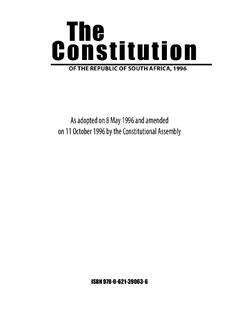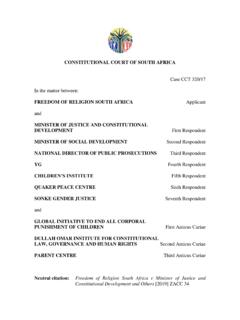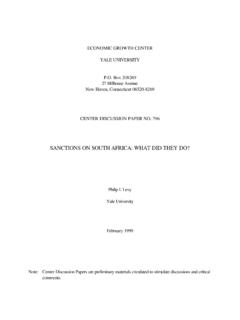Transcription of CONSTITUTIONAL COURT OF SOUTH AFRICA
1 CONSTITUTIONAL COURT OF SOUTH AFRICA Case CCT 164/13 In the matter between: DALUXOLO NICHOLAS SALI Applicant and NATIONAL COMMISSIONER OF THE SOUTH AFRICAN POLICE SERVICE First Respondent PROVINCIAL COMMISSIONER OF THE SOUTH AFRICAN POLICE SERVICE Second Respondent MINISTER OF SAFETY AND SECURITY Third Respondent Neutral citation: Sali v National Commissioner of the SOUTH African Police Service and Others [2014] ZACC 19 Coram: Moseneke ACJ, Skweyiya ADCJ, Cameron J, Dambuza AJ, Froneman J, Jafta J, Khampepe J, Madlanga J, Majiedt AJ, Van der Westhuizen J and Zondo J Heard on: 10 March 2014 Decided on: 19 June 2014 Summary.
2 Section 9 of the constitution unfair discrimination age discrimination SOUTH African Police Service Regulations Regulation 11 age limit for employment of reservists whether age limit is unfairly discriminatory 2 Leave to appeal CONSTITUTIONAL challenge must be clearly and properly raised in the COURT of first instance not in the interests of justice to grant leave where the COURT cannot give effective relief ORDER On appeal from the Labour COURT , Port Elizabeth (Lallie J): 1.
3 The application for leave to appeal is refused. 2. There is no order as to costs. JUDGMENT JAFTA J: Introduction [1] Our constitution forbids unfair discrimination regardless of the context in which it occurs and irrespective of whether the perpetrator is the state or a private person. This case concerns alleged unfair discrimination in the setting of employment where the employer is the state. [2] The case is brought before this COURT as an application for leave to appeal against the order of the Labour COURT in terms of which the applicant s claim was JAFTA J 3 dismissed.
4 Both the Labour COURT and the Labour Appeal COURT refused him leave to appeal. He contended that it was not necessary for him to approach the Supreme COURT of Appeal before coming to this COURT because, as from 23 August 2013, the Supreme COURT of Appeal no longer has the competence to decide appeals from the Labour Courts. [3] The applicant is Mr Daluxolo Nicholas Sali who, at the time the present dispute arose, was a police reservist and stationed at Humewood Police Station in Port Elizabeth.
5 He cites the National Commissioner of Police, the Provincial Commissioner and the Minister of Safety and Security as respondents. CONSTITUTIONAL and legislative background [4] For a better appreciation of the applicant s claim, it is necessary to outline the relevant legal framework. He has instituted an equality claim contending that the decision of the SOUTH African Police Service (SAPS) not to appoint him constituted unfair discrimination, proscribed by section 6 of the Employment Equity Act1 (Equity Act).
6 The applicant based his claim on the Equity Act because it was passed to give effect to the CONSTITUTIONAL right to equality in the workplace. Where there is legislation giving effect to a right in the Bill of Rights, a claimant is not permitted to rely directly on the 1 55 of 1998. 2 This is known as the principle of CONSTITUTIONAL subsidiarity, as discussed below in [72]. JAFTA J 4 [5] However, this does not mean that in determining such claim reference cannot be made to the constitution .
7 The relevant legislation must be interpreted in the context of the constitution . Moreover, the scope and content of the right sought to be enforced by a claimant may be determined with reference to the constitution . Therefore the constitution is a good point at which the outline of the legal framework must begin. [6] Section 9 of the constitution provides: (1) Everyone is equal before the law and has the right to equal protection and benefit of the law. (2) Equality includes the full and equal enjoyment of all rights and freedoms.
8 To promote the achievement of equality, legislative and other measures designed to protect or advance persons, or categories of persons, disadvantaged by unfair discrimination may be taken. (3) The state may not unfairly discriminate directly or indirectly against anyone on one or more grounds, including race, gender, sex, pregnancy, marital status, ethnic or social origin, colour, sexual orientation, age, disability, religion, conscience, belief, culture, language and birth. (4) No person may unfairly discriminate directly or indirectly against anyone on one or more grounds in terms of subsection (3).
9 National legislation must be enacted to prevent or prohibit unfair discrimination. (5) Discrimination on one or more of the grounds listed in subsection (3) is unfair unless it is established that the discrimination is fair. [7] It is significant to note that the constitution lists a number of grounds on which the state is precluded from discriminating unfairly against anyone. And those grounds include age. Notably the constitution does not rank discrimination on the basis of JAFTA J 5 race or gender higher than discrimination on any of the other listed grounds.
10 This means that discrimination on any of the listed grounds must be treated seriously. [8] It is apparent from section 9(5) that discrimination based on any of the listed grounds is presumed to be unfair. A claimant need not prove unfairness. Instead, it is the person who wishes to defend the discrimination who must show that it is fair. [9] The test for determining whether a claim based on unfair discrimination should succeed was laid down by this COURT in In that case this COURT said: At the cost of repetition, it may be as well to tabulate the stages of enquiry which become necessary where an attack is made on a provision in reliance on section 8 of the interim constitution .

















